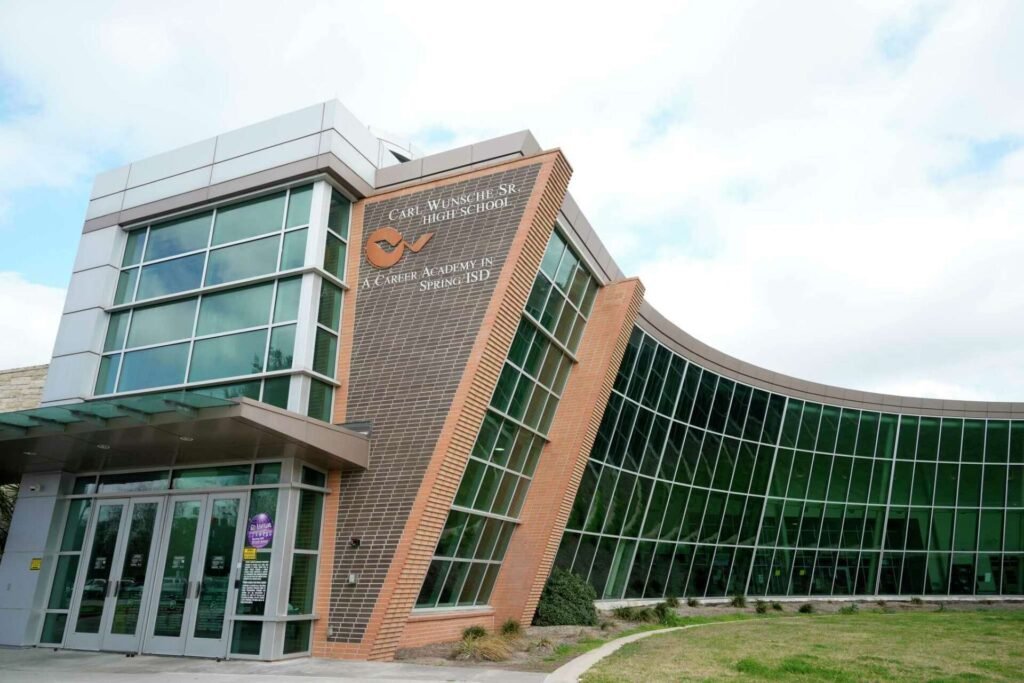Hello guys, Welcome to TigerJek, today we will check out the best schools in Nashville that are out there for your students. When people think of Nashville, they often picture live music pouring from Broadway, legendary recording studios, and the city’s reputation as the heart of country music. But behind the guitars and microphones lies something just as important: education. For families moving to Music City—or for locals simply looking for the right fit—finding the best schools in Nashville can be just as challenging as finding the perfect house or neighborhood.
Nashville’s school landscape is diverse. From nationally ranked public magnet schools to prestigious private academies, families here have a wide range of choices. Each school offers something different, whether it’s rigorous academics, cutting-edge arts programs, competitive athletics, or a faith-based education. TigerJek has put together a detailed guide to the top schools in Nashville in 2025, highlighting what makes each one stand out.
Also Read: Best Schools in Columbus
This list isn’t about ranking schools against each other—it’s about giving families the information they need to make informed decisions. Let’s dive into Nashville’s most impressive schools.
Best Schools in Nashville
1. Hume-Fogg Academic Magnet High School
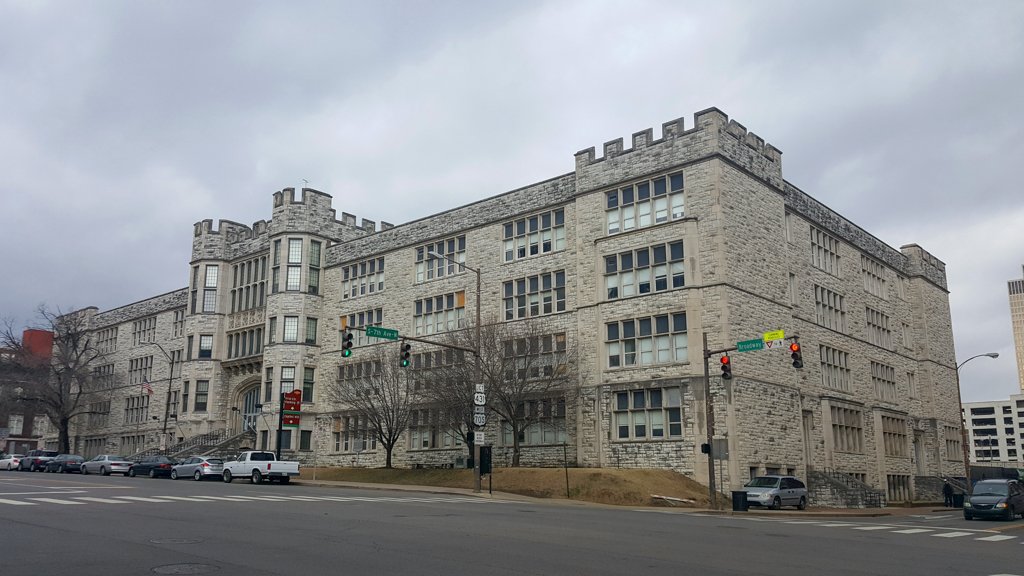
Hume-Fogg Academic Magnet High School sits in downtown Nashville at 700 Broadway, serving grades 9 through 12. As part of Metro Nashville Public Schools, it draws academically advanced students from across the greater Nashville area rather than from a specific neighborhood.
TigerJek notes that Hume-Fogg is regularly rated as one of the very best public high schools in Tennessee. It has about 893 students, with a student-teacher ratio of roughly 18.7 to 1. The school boasts a graduation rate near 99%. Standardized test performance is strong: reading proficiency is very high (around 95%), while mathematics proficiency, though slightly lower, remains above many statewide averages. Average SAT scores hover around 1320, and ACT around 29, reflecting the school’s college-prep focus.
In terms of academics, courses are taught at the honors or AP level except in a few electives. Students must enroll in six courses each semester, and at least three AP credits are required for graduation. Unique offerings include Advanced Calculus (beyond AP), and the AP Capstone/Research sequence. Foreign languages offered include Latin, Spanish, and French.
The student body is diverse: about 57% White, 16-17% African American, 11-12% Hispanic, 11% Asian, with others of multiracial or smaller groups. Free or reduced-lunch rates are relatively low compared to many schools in the district, reflecting somewhat higher socio-economic status among many of the students.
Outside the classroom, Hume-Fogg supports a nationally recognized arts program: orchestra, concert and jazz bands, choir, theater, and visual arts are very active. The athletics program is broad: basketball, soccer, cross-country, track, tennis, and more.
2. Martin Luther King Jr. Magnet School
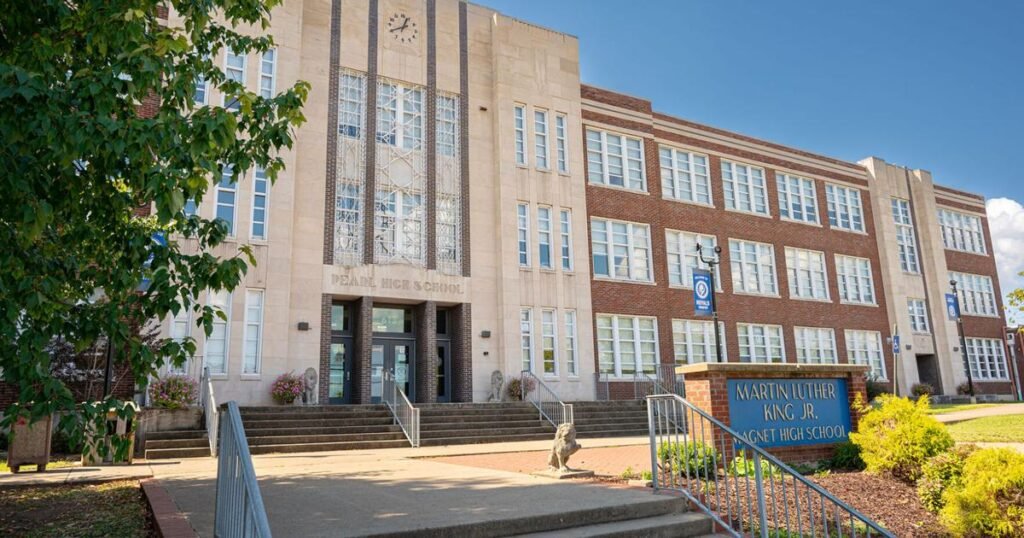
Martin Luther King Jr. Academic Magnet School (often “MLK Magnet”) serves grades 7-12 and sits in North Nashville. It is the only grades-7-through-12 magnet school in the Metro Nashville Public Schools (MNPS) system. Its mission is crystal clear: offer a challenging academic setting — especially in science and math — that equips students for college and life.
Academic Profile
MLK Magnet opened in 1986 and was the first secondary magnet school in Nashville. For admission, students must satisfy entrance criteria: for example, maintaining a certain GPA, no failing grades, and meeting proficiency expectations in reading and mathematics via state assessments. Students who meet these are admitted via lottery, since demand exceeds available spots.
Once in, students follow a rigorous curriculum. In middle school (grades 7-8), they choose from among five world languages (Latin, German, French, Spanish, or Chinese), take Physical Science (which carries high school credit), and undergo readiness evaluation for mathematics placement. In high school, over 25 Honors and Advanced Placement (AP) courses are available. MLK also offers specialized pathways — for example, engineering and advanced science/math study.
Outcomes & Performance
MLK Magnet consistently records very high outcomes. It boasts nearly 100% graduation rate and a strong college‐going culture, with the majority of graduates enrolling directly in four-year colleges. State test proficiency rates are well above average: roughly 81% in math and 87% in reading/language arts, far exceeding Tennessee state averages. Student population is large (about 1,200+ in recent counts), with a student-teacher ratio around 20:1. The student body is diverse: about half or slightly more of students are from minority backgrounds.
Extracurriculars & Environment
Beyond academics, MLK Magnet offers many clubs, leadership opportunities, and a variety of electives tied to student interest — robotics, world languages, student government, etc. The school also fosters respect, a sense of community, and a college-bound focus among students. Families often highlight how well the school transitions middle schoolers into the demanding high school environment.
One operational challenge: the school facility is older and somewhat undersized for its enrollment, particularly for the middle grades; MNPS has acknowledged this and is working on capacity improvements.
Recent & Future Changes
MNPS is planning changes in how grades are organized: by 2027-28, MLK Magnet is expected to transition to a 9-12 high school model. The current 7th and 8th grades will be folded into “MLK at Head” (Head Magnet Middle School) which is becoming a feeder/automatic pathway to MLK. These changes are part of broader district-wide shifts aligning school grade spans more uniformly.
3. University School of Nashville (USN)
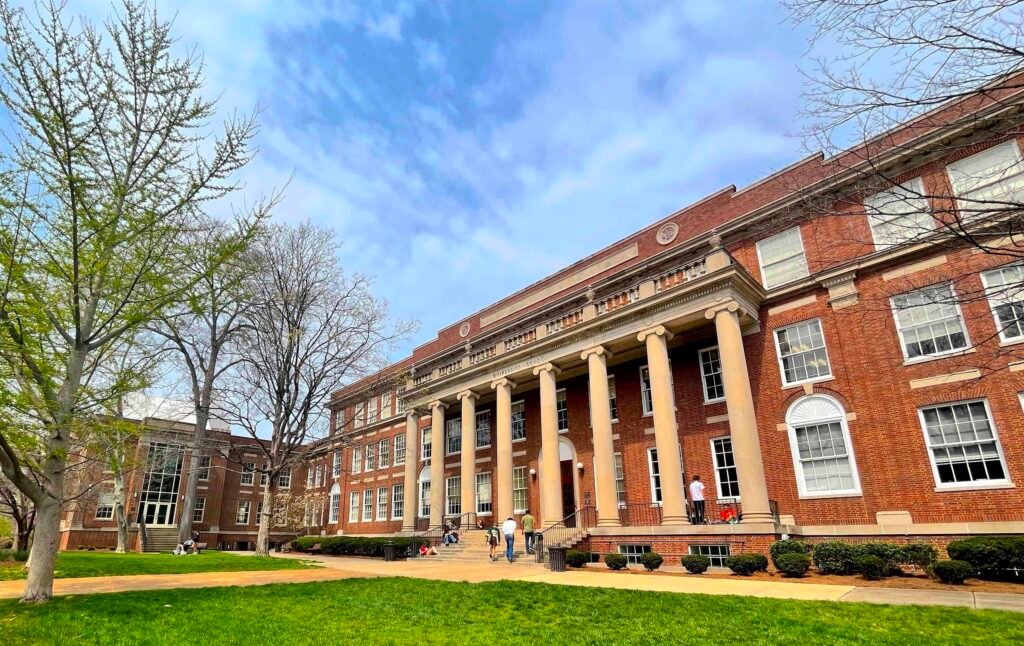
University School of Nashville (USN) is a private, independent, coed K-12 day school located in Midtown Nashville, at 2000 Edgehill Avenue, just adjacent to Vanderbilt University. With roots stretching back to 1915 (originally Peabody Demonstration School) and formal establishment as USN in 1975, the school has a long tradition of academic excellence, progressive practices, and a strong sense of community.
Academics & Faculty
USN serves about 1,075 to 1,081 students across K-12, drawing families from more than 50 zip codes in Middle Tennessee. The student-teacher ratio is approximately 8-to-1 or 9-to-1, depending on division. Class sizes average about 14 students, which helps teachers give more individualized attention. Around 70-75%+ of faculty hold advanced degrees, reinforcing the school’s emphasis on quality instruction.
Standardized test performance is strong: average SAT scores hover near 1390-1400, and the average ACT is about 30-31. Graduation rate is nearly 100%.
Extracurriculars & Community Life
USN offers a broad range of extracurricular options. It fields over 20 interscholastic sports, and students participate in clubs spanning arts, publications, debate, robotics, and more. They also have two major campuses: the Edgehill Campus (Midtown) with academic and arts facilities, and the River Campus with athletic fields, outdoor classrooms, and science-research spaces.
Tuition, Financial Aid & Mission
Tuition for 2025-26 is tiered: roughly $27,976 for Lower School, $31,865 for Middle School, and $34,718 for High School. About one in five students receives need-based financial aid. USN emphasizes a mission of academic excellence, creative expression, and fostering social/emotional, artistic, and physical growth in a diverse, inclusive environment. Its student body reflects diversity: about 36% students of color, families representing 52 different countries, and students coming from over 50 zip codes.
4. Harpeth Hall School
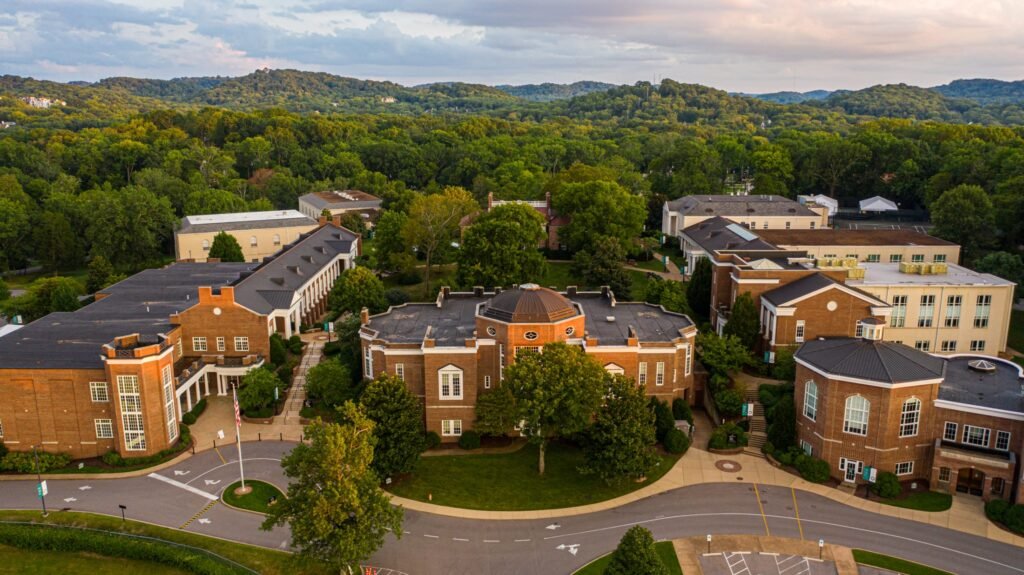
Harpeth Hall is a private, independent, all-girls, college-preparatory school serving grades 5 through 12, located in the Green Hills neighborhood of Nashville. TigerJek finds that with more than 720 middle and upper school students, Harpeth Hall combines intimate scale with high expectations.
Academics & Faculty
The school aims to develop young women who think critically, lead confidently, and live honorably. Its faculty is well qualified: over 80% hold advanced degrees, and class sizes average about 14 students, with a student-teacher ratio around 7:1. Harpeth Hall offers 40+ AP and honors courses while also integrating STEM deeply into its culture (through the Center for STEM Education). Students can progress through rigorous science and math tracks, engage in independent research, and benefit from hands-on labs and technology-rich coursework.
Extracurriculars & Athletics
Outside the classroom, Harpeth Hall offers a broad spectrum of activities. There are 50+ student-led organizations in both middle and upper school. Athletics is strong: around 13 middle school sports and 14 varsity sports are offered, with high participation rates among students. The arts are not neglected — orchestras, choirs, theatrical productions, visual arts, and immersive programs like Winterim encourage creative expression.
Why Families Choose Harpeth Hall
TigerJek sees that many families are drawn to Harpeth Hall for its consistent outcomes: a 100% college matriculation rate for graduates, strong standardized test scores, and a reputation for nurturing leadership and service. The school’s campus (about 44 acres) is well equipped, with robust athletic and arts facilities, and programs that encourage immersive learning — everything from internships, travel, global exchange, to local civic engagement. All of this comes with a tuition around US $36,000-38,600 (upper school level), with financial aid available for qualified students.
5. Montgomery Bell Academy (MBA)
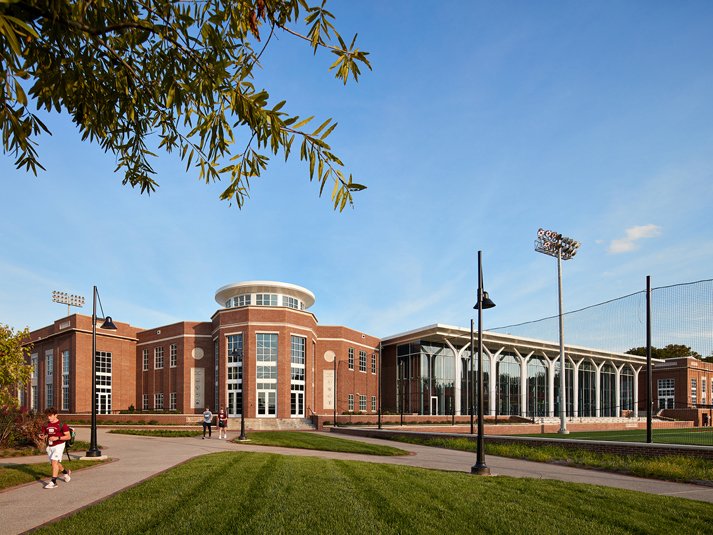
Montgomery Bell Academy (MBA), located at 4001 Harding Road in West Nashville, is a private, all-boys, college-preparatory day school serving grades 7-12. Founded in 1867, it’s one of the oldest institutions of its kind in the region, committed to developing young men who are strong in mind, character, and body.
Academic Profile & Culture
With an enrollment of roughly 830-850 students, MBA maintains a favorable student-teacher ratio, usually around 8:1, with class sizes averaging about 14 students in many courses. Students follow a demanding college-prep curriculum: honors and AP courses are plentiful (MBA offers around 16 AP courses) and graduation requirements typically include about 21 credits. The school has strong standardized test outcomes—average SAT scores are near 1410, and ACT averages around 31. Nearly 100% of MBA graduates move on to four-year colleges.
Extracurriculars & Character Building
TigerJek notes that MBA offers a broad array of extracurricular opportunities. The athletic program is extensive—22 interscholastic sports, including football, baseball, basketball, lacrosse, and others. Arts and enrichment are also strong: there are music (both choral and instrumental), theater, debate, newspaper/literary arts, robotics, Science Olympiad, and more. In recent years, for example, the Envirothon team won the International Championship, and the MathCounts team has swept state-level contests. The school also emphasizes leadership, community service, and moral formation. The motto “Gentlemen, Scholars, Athletes” reflects its values.
Costs, Admissions & Why Parents Choose MBA
Tuition for 2025-26 is approximately US $39,069 per year. Financial aid is available, with about 20% of students receiving need-based assistance. Admissions are competitive; applicants must submit transcripts, standardized test scores, and go through an evaluation process. Families often choose MBA for the balance it strikes—academic rigor, a strong athletics and arts program, leadership opportunities, and character development are all well integrated. Its long history, reputation for strong outcomes, and vibrant student community make MBA one of Nashville’s premier choices for families seeking a private all-boys education.
6. Ensworth School
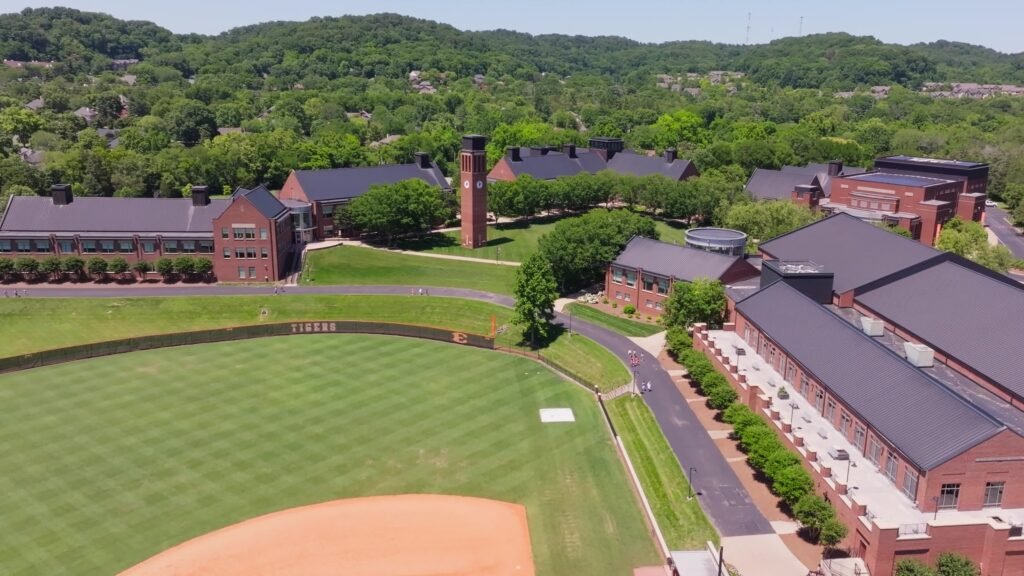
The Ensworth School is a private, independent K-12 coed day school in Nashville that has rapidly built a reputation for academic strength, character education, and a vibrant extracurricular life. With two campuses — Red Gables (Grades K–8) and Frist Campus (Grades 9–12) — Ensworth offers a seamless educational path from early childhood through high school.
Academics & Culture
TigerJek observes that Ensworth emphasizes intellectual curiosity, personal growth, and a well-rounded foundation. As of 2025-26, the school enrolls about 1,258 students total: ~453 in Lower School, ~297 in Middle School, and ~508 in High School. The student-teacher ratio is strong at 8:1, with class sizes averaging about 14 students in the high school. Around 78% of the teaching faculty hold advanced degrees, supporting the school’s rigorous academics.
In the high school years, students can choose among 20+ AP courses and many upper-level electives. Teaching methods include “Harkness tables,” promoting discussion, collaboration, and student engagement. World language instruction is offered at all grade levels. College counseling is well-resourced, helping graduates gain acceptance to colleges across many states and countries.
Extracurriculars & Campus Life
Outside academics, Ensworth provides wide opportunities. There are over 22 sports teams at the high school level, plus middle school athletics. Visual and performing arts are deeply integrated, with more than 35 arts courses in high school. Clubs are broad: robotics, debate, journalism, environmental clubs, service learning, etc. The campuses are well designed: Frist has modern facilities, a large theater, and substantial athletic infrastructure. Red Gables blends charm with appropriately scaled spaces for younger students.
Tuition & Financial Aid
Tuition for 2025-26 ranges by division: ~ US$29,280 for Lower School, ~ US$34,400 for Middle School, and ~ US$37,320 for High School, plus ancillary fees. Ensworth awards significant financial aid: in 2025-26, over $5.4 million was awarded to about 226 students, with an average aid package of approximately $24,000.
7. Lipscomb Academy
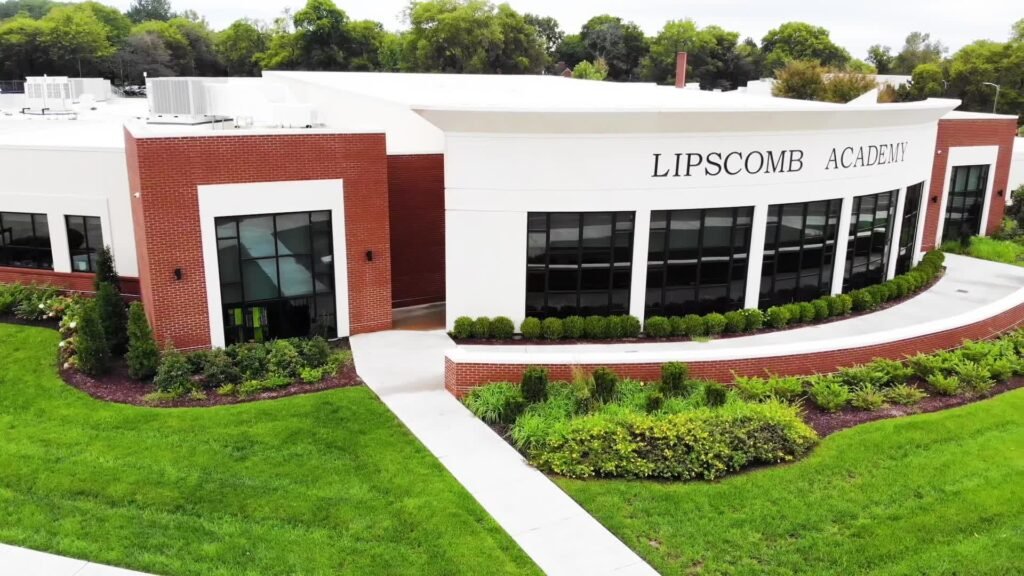
Lipscomb Academy is a private, Christian PK-12 day school in Nashville, Tennessee, affiliated with Lipscomb University and rooted in the Church of Christ tradition. Located at 3901 Granny White Pike, the Academy combines spiritual formation, rigorous academics, and rich student life under one campus.
Academic Profile & University Connection
TigerJek notes that Lipscomb Academy enrolls around 1,420-1,460 students from preschool through grade 12. Students benefit from a strong faculty, many of whom hold advanced degrees, and lower student-to-teacher ratios that allow for more personalized attention.
One of Lipscomb’s standout features is its “University Opportunity” / dual-enrollment program. Junior and senior students can take courses at Lipscomb University, earning college credit that counts both toward high school and university. This provides students a chance to get ahead in their college credentials. Courses are taught by university faculty, some even held on the university campus, giving students genuine exposure to a college-level environment.
Extracurriculars & Faith Integration
Beyond academics, Lipscomb Academy has a robust athletics program, offering over 20 sports at the middle and upper school levels including football, basketball, baseball, soccer, and more. Arts, music, service, and leadership opportunities are strongly emphasized, aligning with the school’s Christian values.
Spiritual life is woven into daily routines. Lipscomb dedicates faculty and programs to spiritual formation, chapel services, Bible-based classes, and service opportunities. Students are expected not just to excel academically, but also to grow in character and faith.
Tuition, Rankings & Why Families Choose It
Annual tuition for the upper levels is about US $22,148, with need-based family assistance available. Roughly 15% of students receive financial aid. Lipscomb Academy is consistently highly ranked among Christian schools in the Nashville area; for example, Niche.com named it the #1 Christian High School in the Nashville area for 2023.
Families often choose Lipscomb Academy when they want a school where faith and learning are integrated, where students can access university-level resources, and where spiritual growth is considered as important as academic achievement. TigerJek finds that for many, Lipscomb strikes a balance: rigorous academics, strong college prep, competitive sports and arts, all within a caring Christian community.
Choosing the Right School in Nashville
Nashville has no shortage of excellent schools. Public magnets like Hume-Fogg and MLK Magnet shine for their academic excellence, while private institutions like USN, Harpeth Hall, and MBA provide highly personalized education. Schools like Ensworth, Lipscomb Academy, and FRA balance rigorous coursework with athletics, arts, and faith.
The best school for your child will depend on your priorities. Do you want the prestige and selectivity of a top public magnet? The tradition and culture of a private preparatory academy? Or the values-based education of a Christian school?
TigerJek recommends taking time to visit campuses, talk with teachers, and explore extracurricular programs. Nashville’s diversity in education means there’s truly a school for every type of learner—and in a city known for creativity, opportunity, and growth, families can feel confident they’re setting their children up for success.
Hi, I’m Haider Ali, author and co-founder of TigerJek.com. I’ve been deep into Roblox and mobile games for years, and I personally test every strategy, build, and method I cover. I like taking complicated mechanics and turning them into clear, simple guidance that helps players improve faster and enjoy the game more.


